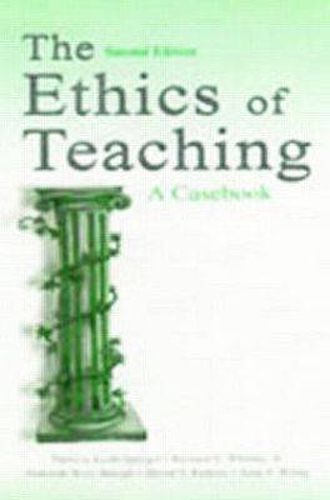Readings Newsletter
Become a Readings Member to make your shopping experience even easier.
Sign in or sign up for free!
You’re not far away from qualifying for FREE standard shipping within Australia
You’ve qualified for FREE standard shipping within Australia
The cart is loading…






Although college-level educators are trained to be experts in their field, they are often ill-prepared for the common ethical risks that will frequently confront them in the halls of academe. Unfortunately, professional ethics codes or institutional policies usually do not address these common risks. This work offers a frank discussion of the most frequently encountered ethical dilemmas that can arise in educational settings, as well as tips on how to avoid these predicaments and how to deal with them when they do occur. The goal is to stimulate discussion and raise faculties’ consciousness about ethical issues. Ethical dilemmas are presented as short case scenarios, most of which are based on actual situations, so as to furnish more realistic and interesting stimuli for individual reflection and group discussion. These scenarios offer the opportunity to consider the subtle complexities inherent in the social and psychological contexts in which educator-student interactions occur and the effects of those complexities on ethical decision making. Each case is followed by a detailed analysis and advice. The 195 cases presented are grouped into 22 chapters representing topics, such as This second edition: focuses on commonly-encountered ethical grey areas that have no clear solution; includes questions to stimulate discussion of related ethical issues; concludes with a chapter on prevention, peer mentoring and intervention; and serves as assigned reading to stimulate group discussion in teaching workshops and faculty development programmes. The first edition of this book evolved by collecting a variety of teaching situations that commonly occur in college and university settings. The authors then created responses to the situations and circulated both the cases and the responses to reviewers from a number of departments across the country. As a result, the vast majority of the cases are discipline free . The second edition features many new cases to reflect recent trends and events related to academic ethics. Questions were added to stimulate discussion and to further elaborate the issues.
$9.00 standard shipping within Australia
FREE standard shipping within Australia for orders over $100.00
Express & International shipping calculated at checkout
Although college-level educators are trained to be experts in their field, they are often ill-prepared for the common ethical risks that will frequently confront them in the halls of academe. Unfortunately, professional ethics codes or institutional policies usually do not address these common risks. This work offers a frank discussion of the most frequently encountered ethical dilemmas that can arise in educational settings, as well as tips on how to avoid these predicaments and how to deal with them when they do occur. The goal is to stimulate discussion and raise faculties’ consciousness about ethical issues. Ethical dilemmas are presented as short case scenarios, most of which are based on actual situations, so as to furnish more realistic and interesting stimuli for individual reflection and group discussion. These scenarios offer the opportunity to consider the subtle complexities inherent in the social and psychological contexts in which educator-student interactions occur and the effects of those complexities on ethical decision making. Each case is followed by a detailed analysis and advice. The 195 cases presented are grouped into 22 chapters representing topics, such as This second edition: focuses on commonly-encountered ethical grey areas that have no clear solution; includes questions to stimulate discussion of related ethical issues; concludes with a chapter on prevention, peer mentoring and intervention; and serves as assigned reading to stimulate group discussion in teaching workshops and faculty development programmes. The first edition of this book evolved by collecting a variety of teaching situations that commonly occur in college and university settings. The authors then created responses to the situations and circulated both the cases and the responses to reviewers from a number of departments across the country. As a result, the vast majority of the cases are discipline free . The second edition features many new cases to reflect recent trends and events related to academic ethics. Questions were added to stimulate discussion and to further elaborate the issues.